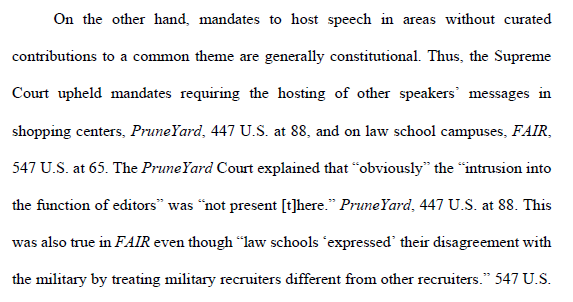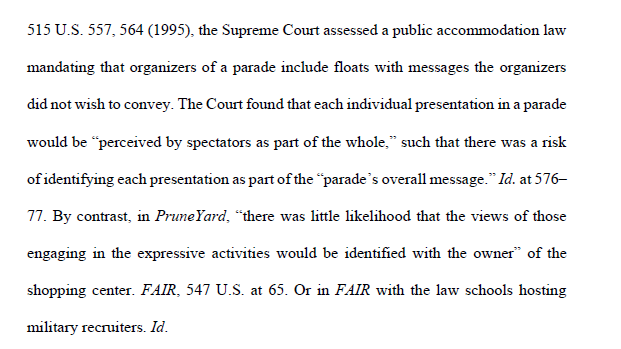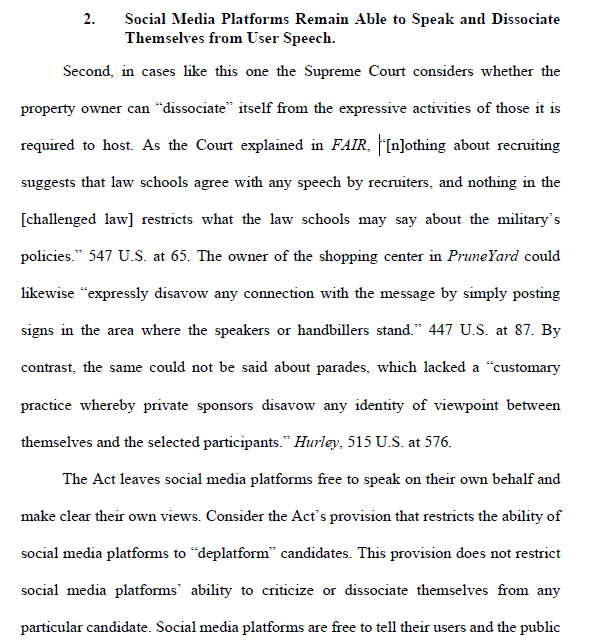
1/ Yesterday I explained how Florida got #Section230 wrong in its opposition to the motion for a preliminary injunction against its social media law.
As promised, here in Part 2, I will tell you why they got the First Amendment wrong too.

As promised, here in Part 2, I will tell you why they got the First Amendment wrong too.
https://twitter.com/AriCohn/status/1407449993879957506

2/ As I said yesterday, this case is really about the First Amendment. Florida tried to frontload Section 230, appealing to judicial restraint. But even if the court ruled on Section 230 preemption in Florida's favor, it would then still have to address the First Amendment issue.
3/ On the other hand, if the court rules on the First Amendment issue favorably to the law's challengers, it doesn't need to decide on how expansively or restrictively to read Section 230, thus avoiding a landmine. The First Amendment *is* the issue, and should be the prime focus
4/ Florida introduces their argument by citing the only two cases they could possibly muster in their defense: Rumsfeld v. FAIR and PruneYard Shopping Center v. Robins. I'll talk about why their specific analogies fail, but I want to take a moment to address FAIR more broadly. 

5/ FAIR involved a challenge to the Solomon Amendment, passed in response to law schools banning military recruiters as a result of opposition to Don't Ask, Don't Tell, which stripped funding from institutions that denied military recruiters access given to other recruiters.
6/ The Supreme Court held that this did not violate law schools' First Amendment rights, which we'll discuss. But something the people advancing FAIR as supporting regulation of social media platforms never seem to mention is *the context* casetext.com/case/rumsfeld-…
7/ FAIR was about the government's ability to force schools to host *government speakers*. And the fact that they were military recruiters weighed even more heavily. The FAIR Court expressly said their decision was based on the deference given to Congress in military affairs. 

8/ As anyone with a basic knowledge of First Amendment history knows, the Court has been more willing than perhaps in any other context to sanction government censorship when it relates to the military--especially when it comes to recruiting.
9/ See, e.g., Schenck v. United States, upholding an Espionage Act conviction for sending material opposing the draft to men who had been called up, giving us that shamefully horrid "fire in a crowded theater" line that haunts @popehat (and all First Amendment lawyers) still.
10/ But if judicial deference is "at its apogee" with respect to laws based on Congress's power to raise an army, judicial deference could fairly be characterized as closer to, or at, its nadir when considering laws more broadly regulating expression.
11/ There are other reasons why FAIR is distinguishable, but this context is important.
12/ The Supreme Court found it worthy to explain that the military (government) nature of the speakers schools were forced to host bore heavily on its decision, and it would be disingenuous to argue that FAIR controls without accounting for this key factor not present here.
13/ Florida continues arguing that SB 7072 regulates pure, non-expressive conduct, but that remains...unconvincing. Choosing what content or users to allow on a platforms is undoubtedly expressive in nature. 

14/ In FAIR, the Court found that the act of excluding military recruiters was not expressive--because they only became expressive by virtue of an accompanying explanation; the message being conveyed wasn't obvious.
But content moderation is different.
But content moderation is different.

15/ The entire enterprise of social media is inherently expressive in nature. Social media exists to facilitate discussion, and choosing who may participate and in what way expresses what the acceptable bounds of those discussions are.
16/ This inherent expressive nature is also why FAIR doesn't really line up for Florida's overarching argument: that social media platforms don't have a common theme or message, and that therefore forcing them to host certain speech doesn't impose on their expressive rights. 

17/ Again, FAIR relied heavily on the purpose of the regulated conduct: job recruiting. The expression attendant to job recruiting is fairly incidental. Not so with social media, where the entire point is to facilitate that discussion which the platform *wishes* to facilitate.
18/ And as @corbinkbarthold and @berinszoka pointed out, it might not make for a particularly exciting parade, but the platforms themselves definitely see themselves has having a theme: lawfareblog.com/justice-thomas… 

19/ FAIR's reasoning that hosting recruiters didn't sufficiently interfere with schools' message suffers the same problem. And in fact platforms do not take all users indiscriminately; they have rules about what is allowed. 

20/ The combination of social media's purpose and their rules militate for the opposite finding here. Leaving content up does implicate a platform's expression, vis-a-vis its determinations of what conversations or speakers they find worthy of publication.
21/ Reading FAIR in light of whose speech the government was forcing schools to host and in what context, its support for Florida's law is questionable. It strikes me as unlikely that the Court would uphold, say, a law forcing all universities to host any and all outside speakers
22/ Now let's talk about PruneYard, which Florida argues made it permissible for states to force platforms to host speakers because "the intrusion into the function of editors" is not present. 

23/ PruneYard affirmed a California Supreme Court decision holding that the California Constitution protected the right of some students to solicit signatures at a private shopping mall. It's an add anomaly that hasn't been extended but still lurks. casetext.com/case/pruneyard…
24/ But look at *why*, according to the Court the "intrusion into the functions of editors" was not a concern. Each one of those concerns *is* present here. 

25/ First, there absolutely is a penalty exacted against platforms based on their content. Like in Tornillo, if a platform refuses to publish a candidate's speech, they face penalties.
26/ There is also a danger that the variety of public debate will be dampened by deterring the publication of statements that might trigger the statute.
27/ If content moderation is subject to a "consistency" test, platforms might well decide to not engage in the kind of line-drawing that would result in more expression being left up. Facebook's recent satire debacle highlights how this would almost certainly happen.
28/ The "function of editors" is fundamentally what this is all about! All the reasons the PruneYard Court had for dismissing Tornillo in that case provide the precise reasons why Tornillo controls here.
29/ The PruneYard Court also noted that the students were being non-disruptive, and that no customers complained. I don't think I need to really explain that social media is rife with disruptive actors who are vociferously complained about. 

30/ Those complaints touch on another argument that Florida raises, based on PruneYard and FAIR: that there's no risk of a platform being associated with the views expressed by its users. 



31/ But reality paints a different picture, as we noted in our brief. By having content standards, platforms have opened themselves up to the position that content which is not removed has been deemed the kind of thing they want on their platforms. 

32/ And people do in fact associate them with the speech they allow. Advertisers don't want their products appearing next to certain content, people and organizations fault platforms for not removing certain things, and Congress indiscriminately goes bonkers as it is wont to do.
33/ Not for nothing, another concern dismissed by PruneYard is also present here. Government assessment of the consistency or fairness of content moderation--which is inherently subjective--presents a rather large risk of discrimination for or against particular messages. 

34/ The other factor that Florida argues supports its authority to regulate content moderation is that platforms are free to disassociate themselves with user speech. 

35/ But that's not practical when users post thousands of tweets every second, and let's just remember how insane everyone went about Twitter labeling tweets...
36/ In any event, the ability of a host to disassociate themselves from speech simply can't be a sufficient basis, standing alone, to constitutionally justify mandating carriage of expression. Because their other arguments fail, this should not save the law.
37/ Florida's argument is thin, and ignores critical distinctions between the cases they cite in support and the facts now at hand.
But I guess they had to at least try.
But I guess they had to at least try.
38/ And now we reach the latest fad argument (at least they spared us Marsh v. Alabama); common carriage. Egged on by Justice Thomas's rant, Florida tells the court that it can treat social media as a common carrier obligated to "serve the public indiscriminately." 

39/ But as we explained in our amicus brief, that argument stretches the concept of common carriage far past the breaking point. Common carriage is fundamentally about indiscriminately transporting things between points for the public at large. techfreedom.org/wp-content/upl… 

40/ Social media platforms aren't in the business of simply transporting data from Point A to Point B as "interchangeable carrier of widgets." And further, consider that *text messaging* is not a basic transmission service subject to common carriage. 



41/ If the information processing of text messaging removes it from the ambit of common carriage, it would make absolutely no sense to have the opposite rule for social media platforms. 

42/ "But telephony is subject to common carriage," Florida and everyone who read Justice Thomas retort. Here's the difference: telephone calls are private, fleeting correspondence that is known only to participants and generally not preserved.
43/ In contrast, social media platforms are public-facing messages, intended generally for public consumption, and preserved for posterity. This is about expression, not carriage. 

44/ And finally, social media is not "common." Common carriage, is, as the D.C. Circuit said, about protecting the reasonable expectations of customers who believe they are being offered a neutral conduit.
45/ As has been explained countless times, the courts evaded First Amendment concerns about the FCC's net neutrality rules by saying that an ISP that did *not* hold itself out as a neutral conduit for Internet traffic would not be subject to the rules. 

46/ Social media is an inherently edited service. Platforms don't claim to carry all expression indiscriminately. They tell you up front that they do not. Platforms have subjective rules and retain the discretion to update or change them based on what content they feel is worthy. 

47/ While Florida blithely concludes that treating social media platforms as common carriers obviates all of the First Amendment issues, as we say in our brief:
"Common carriage" is not a magic label that can make this First Amendment violation go away.
"Common carriage" is not a magic label that can make this First Amendment violation go away.
• • •
Missing some Tweet in this thread? You can try to
force a refresh









